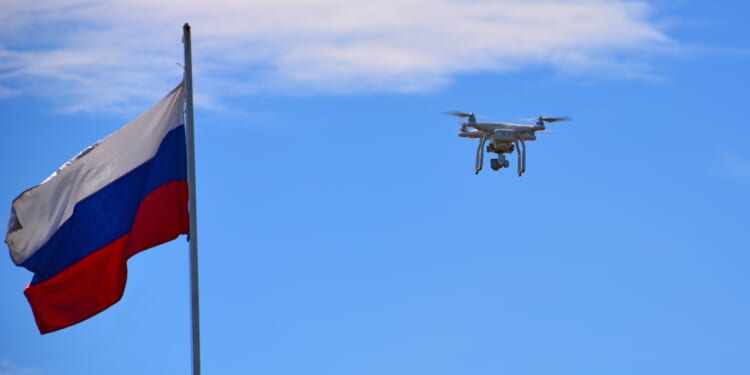The Kulibin Club, a Russian government-funded startup incubator for military projects, is reported to have delivered “thousands of hi-tech electronic warfare systems” to the Russian military.
Last June, Ukraine’s “Operation Spiderweb” struck at least 40 Russian warplanes, with around 10 destroyed at remote air bases. The daring raid followed past drone strikes on Russian military facilities, and even attempts to hit the Kremlin in Moscow. Kyiv has continued to employ drones as a force multiplier in the ongoing war, but Russia announced this week that it has developed a high-speed vertical takeoff interceptor drone.
According to a report from Russian state news agency TASS, the initial batches include “hundreds of interceptor drones,” which will be used in trials before entering serial production.
The “Kulibin Club,” an organization within the All-Russian People’s Front—a political coalition established by Russian President Vladimir Putin in 2011—has been leading the effort to develop unmanned aerial systems (UAS) for use by the Kremlin.
“Aircraft-type drones—both reconnaissance and attack UAVs that also fly towards civilian facilities—pose a major problem today. An interceptor drone is designed to intercept these UAVs, thus easing the burden on air defenses and increasing the efficiency of strikes on enemy targets,” a representative of the Kulibin Club explained.
We Still Don’t Know Much About Russia’s New Interceptor Drones
Few details have been made public, but TASS confirmed that each drone has vertical takeoff capability and is armed with an explosive charge that can be “activated automatically” when it approaches a potential threat. The drones feature “entirely Russian-made software,” including artificial intelligence (AI) algorithms that can help it carry out the mission to intercept and destroy incoming aerial threats.
“The machine learning algorithms and artificial intelligence are domestic innovations. Correspondingly, an interceptor drone automatically flies using designated target acquisition data to a range of 10-15 km, which is typically sufficient,” the club spokesperson added. “Artificial intelligence and the onboard computer help direct it towards the target, hunt it down and destroy it. The system learns and constantly improves its potential.”
The “Kulibin Club”: Y Combinator for the Kremlin

The Kulibin Club hasn’t garnered much attention in the West, so details remain sparse. What is known is that it is a government-aligned organization that works with inventors and craftsmen throughout Russia. In that respect, it is similar to tech incubators in the United States, which support the early-stage development of emerging technology by providing resources, mentorship, and workspaces.
The Russian-based “club” is unique in that it exclusively develops platforms and systems for the Russian military. The anti-drone interceptors are among its current projects.
The club is likely named for Russian mechanic and inventor Ivan Kulibin (1735-1818), who rose to prominence despite having no formal higher education. Kulibin is credited with designing and developing prosthetic limbs and also aided in the assembly of the famous “Peacock Clock,” now in the collection of the Hermitage Museum in St. Petersburg. His name has become a byword in Russia for a skilled yet self-taught inventor. Mikhail Kalashnikov, the self-taught developer of the AK-47 assault rifle, is considered an example of a Kulibin.
The Kulibin Club is reported to have delivered “thousands of hi-tech electronic warfare systems” to Russian military personnel on the frontline in Ukraine to counter Kyiv’s drones.
In addition, it has developed drones, self-propelled robotic carts, and other “innovative equipment” used by the Kremlin’s troops.
About the Author: Peter Suciu
Peter Suciu has contributed over 3,200 published pieces to more than four dozen magazines and websites over a 30-year career in journalism. He regularly writes about military hardware, firearms history, cybersecurity, politics, and international affairs. Peter is also a contributing writer for Forbes and Clearance Jobs. He is based in Michigan. You can follow him on Twitter: @PeterSuciu. You can email the author: [email protected].
Image: Shutterstock / SERGEY ERZIKOV.
















